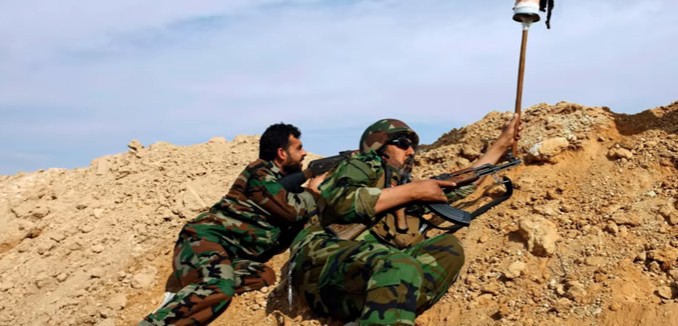Hezbollah and Iran-backed militias advanced closer to Syria’s border with Israel marking “a new expansion of Tehran’s influence” on Israel’s northeastern neighbor.
The Syrian army, supported by Druze militias, and Iran-backed forces, has “pushed deeper into the last rebel-held enclave” approaching the border area with Israel, Reuters reported on Sunday.
According to rebel sources, the Syrian army approached Beit Jin and surrounded a village that has been controlled by rebels for several years. Beit Jinn is the final rebel stronghold in the area southwest of Damascus, which is also known as Western Ghouta.
The presence of Iran-backed forces and commanders from Hezbollah, the Lebanese terrorist organization, backing the Syrian army was confirmed by a Western intelligence source. The same source said that Iran was seeking to “establish a strategic presence” in Syria Golan Heights, opposite Israel’s border.
Regime forces that have been seeking to defeat the rebels have been relying on “heavy bombing on civilian areas and years of siege tactics,” to force rebels to surrender. The rebels in Beit Jinn are largely locals. Some are Sunni jihadists, others are members of the Free Syrian Army. Both groups are operating under the name of Itihad Quwt Jabal al Sheikh, or “Union of fighters of Jabal al Sheikh.”
An official of one of the rebel groups, Liwa al Furqan, Suhaib al Ruhail, told Reuters, “The Iranian-backed militias are trying to consolidate their sphere of influence all the way from southwest of Damascus to the Israeli border.”
Although it has largely stayed out of Syria’s civil war, Israel has said that it considers the establishment of Iranian military presence in Syria as a red line that it could not accept. Three weeks ago, Israeli jets were reported to have struck an Iranian military base south of Damascus.
Also earlier this month, H. R. McMaster, the National Security Adviser of the United States, said that 80% of pro-Assad forces in Syria are Iranian proxies.
Iran has been seeking to create a land link to the Mediterranean to threaten Israel and extend its influence, through what is called the “Shiite crescent,” across the Middle East.
[Photo: Wochit News / YouTube]




